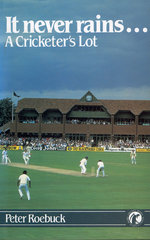It Never Rains
David Taylor |Published: 1984
Pages: 151
Author: Roebuck, Peter
Publisher: George Allen and Unwin
Rating: 4 stars

This week I re-read Peter Roebuck’s second book, a diary of the 1983 season, an eventful one in which Somerset won the Nat West Trophy (the 60 over competition formerly known as the Gillette Cup) and during which he captained the county for the first time. The reason for taking another look at it was, of course, Roebuck’s recent death in South Africa, in view of which his writing has inevitably been re-assessed.
This is an unusual cricket book – there are no scorecards (only abbreviated scores at the end of each day’s entry), no averages and no pictures, save the simple but charming drawings by Mike Tarr at the start of each chapter. But there is plenty of technical analysis of his own dismissals by Roebuck (something he seems to do more when dismissed cheaply, as I suppose you’d expect) as well as examinations of the techniques of team-mates, notably Viv Richards and Joel Garner, and opponents. He also ruminates on the reasons for Somerset’s defeats, and at one point concludes that they are less motivated than they were when searching for their first title.
With the spring plagued by rain, the season takes a while to get going, and there is a sense of ennui from a comment such as “week three is over, another 21 to go until the end of the season.” But he enjoys the game more when the sun finally makes an appearance and he starts showing some form. In the early to mid 1980s Roebuck was often discussed as an England candidate, but the batsman himself is not so sure: “I’m not certain that deep down I want to represent my country. Not everyone does.” And later, when it’s suggested that a good performance against the New Zealanders would help his international prospects, “I replied I didn’t really think I had any international hopes … I suspect I could tolerate the pressures of Test cricket, it’s the exposure I’m not so sure about … does every MP want to be the Prime Minister?”
I found the last comment a little curious, because it alludes more to the pressures of leadership, and nobody was suggesting that Roebuck should captain the England team. With regular skipper Brian Rose injured he has a run of games in charge of Somerset, but is really no more than fourth or fifth choice, and recognises that. He could little have guessed that three years later he would be in charge full-time at one of the most tumultuous periods in the club’s history.
The book isn’t all deep introspection; there’s a good deal of humour in it as well, even if it tends to be of a wry and self-deprecating nature – with ‘sat nav’ many years in the future, there are several comical accounts of getting lost while trying to find hotels – and it is clear that Roebuck by and large enjoys playing cricket for a living. Looking for clues as to his eventual fate is a hopeless exercise for a book written almost 30 years ago, but he mentions the tragic Harold Gimblett, who took his own life in 1978, in the preface and again in the opening chapter. All that can be concluded from this book is that Roebuck was someone who thought deeply about the game and the people he played with and against. Perhaps because this is a sequel, of sorts, to “Slices of Cricket” he isn’t good at introducing players – at one point he mentions someone called “Wilson” and it was a while before I realised he meant the former Surrey pace bowler Hugh Wilson; I’d forgotten he ended his career at Somerset.
I have to be honest and say that that if I’d reviewed this book when I first read it, around five years ago, I’d probably have given it no more than three stars; I found it enjoyable but a little brief. That it gets one more now is not some pointless gesture of sympathy towards the recently deceased but because on reading it again I found I could appreciate the economy of the prose – a 300 page book would certainly not have been twice as good. This is an excellent picture of English cricket in 1983, packed with thought-provoking comments, from someone who would prove to be a better writer than player.







Leave a comment